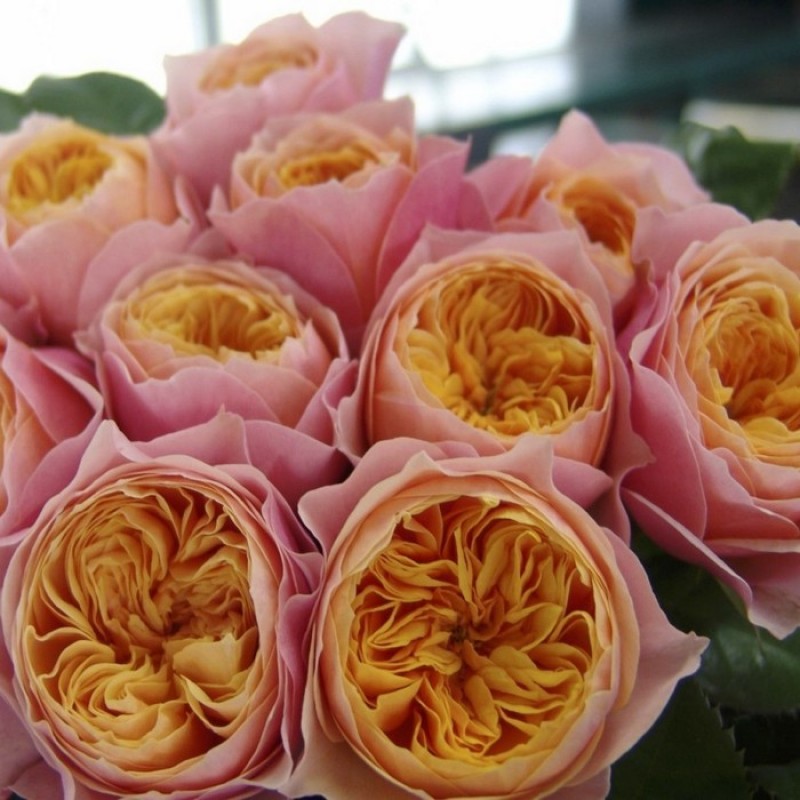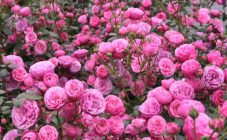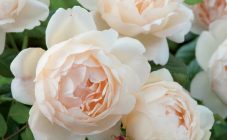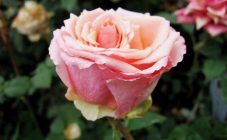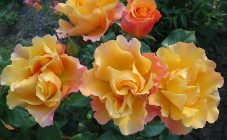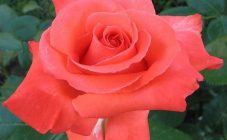Content:
Roses are rightfully considered the queens of the garden, many lovers have large collections of different varieties, closely follow the novelties and developments of breeders. One of the new favorites of florists is the elite cut rose Vuvuzela.
History
The originator of the Vuvuzela variety is the company from the Netherlands “De Ruiter’s”. The year of introduction is considered to be 2011, the flower was brought to Russia a little later, therefore it is considered a novelty on the domestic market.
Holland is famous for its floriculture schools and breeding institutes, some call it the spiritual center for growing roses. The idea of creating the Vuvuzela variety is to breed constantly blooming, disease-resistant garden roses for areas from the fourth climatic zone (with low winter temperatures). This variety belongs to the Schrab class, a type of English garden rose, with an original flower shape and a palette of colors, it leaves no one indifferent.
Characteristics and features of the variety
Rose vuvuzela is a frost-resistant plant, according to the USDA classification it belongs to the sixth zone of frost resistance, i.e. withstands the lowest possible temperature of -23 degrees. The bush is quite compact - it grows up to 1.1 meters in height and up to 0.6 meters in diameter. Vuvuzela is a self-rooted rose, i.e. it is grown from the cuttings of the mother bush, and not by planting on the roots of the rose hips, which allows you to preserve all the characteristics of the variety without reborn back into rose hips, and also withstands low temperatures.
The leafiness is moderate, the leaves are of the usual shape for roses, the edge is slightly serrated, green with an olive tint. The root system is quite powerful, branched, extends to a depth of 60 centimeters, does not form lateral rhizomes.
The main feature that brought popularity to the new variety is the color palette of this rose. The flower petals have an extraordinary velvet coral color, which varies within one bud to sandy, orange or creamy yellow and even golden hues. The Vuvuzela varieties are:
- Vuvuzela Gold;
- rose Romantic Vuvuzela;
- Vuvuzela Peach
Vuvuzela peach rose with coral petals and a pale pink border, the core resembles an apricot in color (peach - English "apricot"). Unfortunately, these roses are less resistant to low temperatures. A subspecies of the Vuvuzela variety, romantic, fully justifies its romantic name, these flowers of innocent salmon color often become the basis of a bride's bouquet at weddings (you can also make mono bouquets) - they look both gentle and luxurious, interesting and elegant. Florists also use such roses to create complex and expensive floral decorative compositions.
Flowers of this variety smell almost imperceptible, delicate aroma, pollinated by bees and butterflies. The plant is quite resistant to diseases of powdery mildew and black spot (susceptibility is no more than 25 percent).
Agricultural technology of cultivation
Rose bushes grow well and bloom profusely when there is enough light, moisture, fresh air flow, as well as mineral and nutrients in the soil.The length of daylight hours greatly affects the formation and development of the buds of these light-loving plants. It is advisable to plant Vuvuzelu on loamy, sufficiently humus soils. If the pH shows an acidic or alkaline reaction, the flowers will be inhibited and grow poorly, preferably slightly acidic soils. If the soil in the area for the rose garden is damp, heavy, clayey or acidic, it can be improved with humus, peat, compost, and also remove excess acidity with slaked lime or chalk. Stony or sandy soils do not retain moisture and heat up in hot weather.
Like other varieties of self-rooted roses, Vuvuzela propagation is carried out using cuttings, as well as by layering and by dividing adult bushes.
Rose seedlings are placed in planting holes, the depth of which should not be less than 0.7 meters, diameter - from 0.6 to 1.0 meters. Such dimensions are necessary for the unhindered growth of the root system of the Vuvuzela rose bush. Before planting, the roots are treated with the composition for better growth.
The recommended planting scheme is triangular, with a step of half a meter between the bushes, then the effect of flower thickets will be obtained.
After planting (in early spring) and in July, roses should be mulched, it is best to do this with humus. It is also good to use horse manure as a fertilizer (it does not draw nitrogen out of the soil), covered with a two-centimeter layer. During the formation of buds, it is necessary to feed the plant with calcium-phosphorus compounds.
Vuvuzela rose bushes care procedures include:
- moistening (preferably in the evening) of the soil in the root zone as it dries;
- cutting off old and weakened shoots, as well as pinching off excess buds;
- the formation of a bush by cutting off 1/3 of unnecessary branches;
- ripe shoots and faded buds begin to be cut in mid-October;
- sheltering bushes for the winter with dry leaves, sawdust, straw or an earthen mixture (with peat or humus).
Advantages and disadvantages of the variety
The Vuvuzela variety of peony roses has quite a few advantages:
- grow quickly;
- bloom profusely and magnificently;
- do not require special care, frost-resistant;
- resistant to diseases and pests;
- looks great in bouquets and goes well with other plants;
- long flowering - more than 10 days.
There are some disadvantages that lovers of this variety can easily forgive:
- the smell is very weak, almost imperceptible (but this can be a plus - such bouquets can be presented to allergy sufferers);
- after rain, flowers may become covered with small specks;
- with an excess of fertilizer in the soil, the foliage can turn yellow and fall off.
Roses-novelties of the Dutch selection of Vuvuzela have a surprisingly delicate and unusual coloring in the "romantic" style, easily tolerate low temperatures and bloom luxuriantly twice a year. All these properties have won the sympathy of gardeners for this variety, not only in Europe, but also in Russia.
